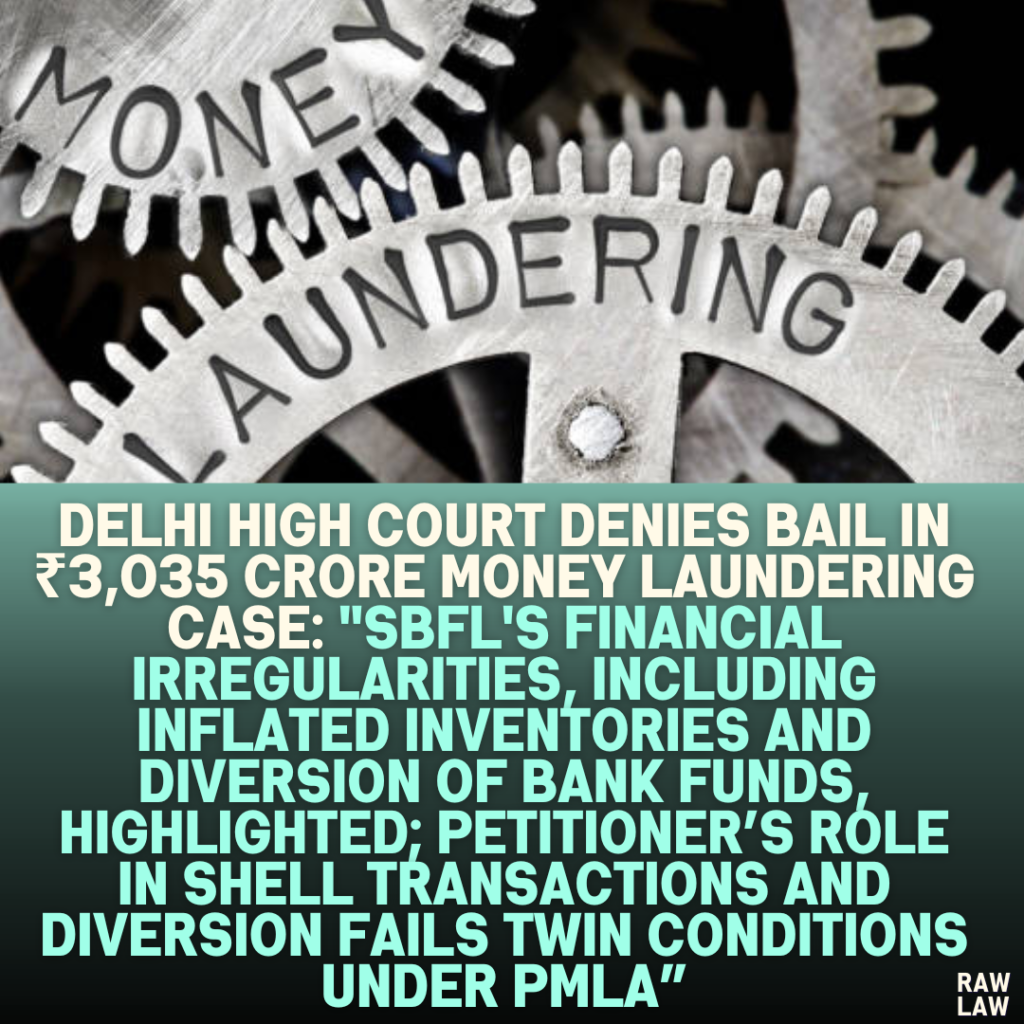Court’s Decision
The court’s decision to dismiss the bail application was based on evidence indicating the petitioner’s involvement in financial crimes. The judgment leaned on the twin conditions of Section 45 of the Prevention of Money Laundering Act (PMLA), which require the court to:
- Believe the accused is not guilty of the alleged offense, and
- Be satisfied that they are not likely to commit such offenses while on bail.
The court found no reasonable grounds to satisfy either condition, emphasizing the seriousness of the economic offense and its impact on public funds.
Facts
- Background of SBFL: Shakti Bhog Foods Ltd. (SBFL) was a family-managed business engaged in food manufacturing.
- Nature of Allegations: SBFL faced accusations of financial irregularities, including inflated inventories and diversion of funds borrowed from a consortium of banks. These actions resulted in a ₹3,035.52 crore loss to public funds.
- Audit Findings: A forensic audit commissioned by the banks revealed systematic fraud, including:
- Fabricated financial transactions.
- Diversion of funds into shell companies and personal accounts.
- Bogus export activities with unaccounted foreign income.
- Role of the Petitioner: The petitioner, a director in SBFL and its group entities, was alleged to be a key player in orchestrating these activities. Investigative agencies tied him to significant financial transactions that lacked genuine business purpose.
Issues
- Entitlement to Bail: Did the petitioner meet the twin conditions for bail under Section 45 of PMLA?
- Extended Custody: Could the petitioner’s prolonged detention, amounting to 26 months, be a valid ground for bail?
Petitioner’s Arguments
- Limited Role: The petitioner claimed that his involvement was minimal and primarily under the instructions of his father, the managing director.
- Prolonged Detention: He highlighted that he had already been in custody for 26 months, constituting nearly one-third of the maximum punishment under PMLA.
- Parity with Co-accused: He argued that other co-accused individuals were granted bail on medical or other grounds, and his role was less significant than theirs.
- Questioning Evidence: The petitioner contended that the statements of witnesses recorded under Section 50 of the PMLA should not be accepted as conclusive proof at the bail stage.
Respondent’s Arguments
- Graver Role: The Enforcement Directorate (ED) emphasized the petitioner’s active role in managing and executing SBFL’s financial manipulations.
- Comparison with Co-accused: ED argued that the petitioner’s involvement was more significant than co-accused whose bail was denied by the Supreme Court.
- Evidence Against Petitioner:
- Witness statements.
- Financial records linking the petitioner to diversion of funds.
- His role as a signatory for dummy entities and shell companies.
- Public Interest: ED stressed the importance of protecting public funds, arguing that such crimes undermine economic stability.
Analysis of the Law
The court rigorously applied the twin conditions of Section 45 of PMLA, emphasizing the following:
- The petitioner failed to demonstrate that he was not guilty of the alleged offenses.
- Economic offenses, particularly those involving public funds, must be treated with gravity due to their broader societal impact.
Precedent Analysis
- Supreme Court Guidance: The court referred to prior rulings emphasizing the strict application of the PMLA’s twin conditions.
- Role of Witness Statements: It reiterated the admissibility of statements recorded under Section 50 of PMLA, as upheld in previous judgments.
Court’s Reasoning
- Evidence Against the Petitioner: The court reviewed the extensive material presented by the ED, including:
- Inflated inventories used as collateral for loans.
- Fabricated transactions with shell companies.
- Discrepancies in export earnings and unreported foreign income.
- Nature of the Offense: The court noted the scale and sophistication of the alleged fraud, highlighting that the petitioner directly benefited from the proceeds of crime.
- Comparison with Co-accused: The denial of bail to similarly placed co-accused by higher courts reinforced the decision.
Conclusion
The bail application was dismissed due to:
- The lack of reasonable grounds to believe the petitioner’s innocence.
- The substantial evidence of his active involvement in a large-scale financial crime.
- The public interest in ensuring accountability for economic offenses.
Implications
- Stringent Application of PMLA: The judgment underscores the judiciary’s strict stance on economic crimes, particularly those involving public funds.
- Deterrent Effect: It serves as a warning against fraudulent financial practices, emphasizing that the gravity of such offenses outweighs the consideration of prolonged pre-trial detention.




Pingback: Gauhati High Court Quashes Cognizance Against Apollo Hospital Doctor in Death of Mother and Unborn Child: "Expert Medical Opinion Essential in Medical Negligence Cases; Matter Remanded Back for Fresh Inquiry Under Section 202 CrPC" - Raw Law